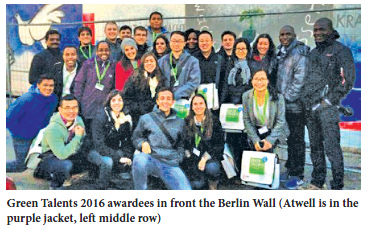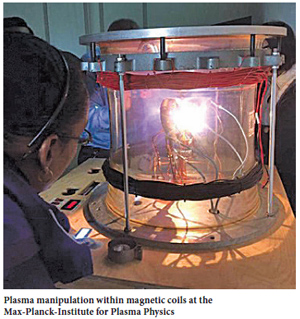 |
 |
 |
|
November 2016 |
When I learned about Green Talents, hosted by the German Federal Ministry of Education and Research (BMBF) I was immediately attracted to this highly competitive award as it promoted the international exchange of innovative green ideas from global award winners. I was selected by a high ranking expert jury along with 25 other Greet Talents from 22 different countries. The jury was impressed by the global significance of my research and valued my outstanding academic record reflected by numerous scientific publications in high impact prestigious international journals. The aims of the Green Talents programme are to intensify international sustainability research and development through cooperation between threshold and developing countries. The programme came into being as a result of the German government recognising that no single country or discipline alone can come up with a holistic solution to the developmental challenges ahead. Germany, as front runner in environmental technologies, sought to foster the mobility and creativity of promising young scientists by connecting them to a unique global network through the Green Talents programme. The award entailed many opportunities for creating longlasting partnerships with German research elite. It firstly includes an invitation to Germany to participate in a two-week Science Forum which involves touring Germany’s top research institutes such as the Siemens‘ Gas Turbine Plant Moabit, the Potsdam Institute for Climate Impact Research, the Max-Planck-Institute for Plasma Physics, Technical University Hamburg-Harburg, the Southern African Science Service Center for Climate Change and Adaptive Land Management and the Alfred Wegener Institute for Polar and Marine Research. Each of these research institutes offers exclusive insights into their facilities and projects. The award also offers the opportunity to present your research in personal discussions held with experts of your choice. Secondly, another invitation to Germany is issued for a fully funded research stay of up to three months where new experiences can be gained at a research institution of your choice to advance your professional career. Lastly, Green Talents give exclusive access to the Green Talents network made up of high potentials from all over the world in the field of sustainability development. The awardees of the programme benefit through gaining first-hand information about Germany’s research landscape, laying the foundation for the establishment of international research cooperation in the near future. Creating linkages with German experts allows an awardee to access the German research community fostering the exchange of ideas as well as the discussion about potential collaborations. Awardees are given the unique opportunity to learn about sustainability research in Germany while building up or strengthening professional networks. The impact of my time spent in Germany was surely immeasurable. The opportunity to tour various research institutes ignited ideas that can be applied to my own research in soil ecosystem services and the sustainable management of the impacts of land use development upon this ecosystem. Interacting with German experts enabled me to form relationships for the sharing of resources, information and to obtain expert advice and feedback on my work. The Green Talents science forum afforded me the opportunity to show case my research while seeing what other scientists are doing in the field of sustainability research. The science forum highlighted potential sources for research funding in Germany while offering targeted workshops on water sanitation, food security, climate change, urban planning and ecosystems. Going forward, the new insights obtained will give an international perspective which will strengthen my work and sharpen my research skills which can be shared to the benefit of the Department of Geography and the University at large.
Geography has been taught at the Mona Campus of The UWI since the 1960s; however, it was only introduced to Trinidad and Tobago in 2005 as a Geography Unit in the Department of Food Production of the Faculty of Science and Agriculture. The Department of Geography was inaugurated in 2012 within the new Faculty of Food and Agriculture, where it offers a BSc Major, BSc Special, and administers the Environment and Natural Resources anagement Major. The Department of Geography also offers research degrees, the MPhil and PhD, at a postgraduate level. Geography is taught as two integrated components: Physical Geography and Human Geography, both of which examine the complex relationships between the environment (natural or built) and its effects on people, as well as human impacts on the environment. Current research in the Department includes climate change adaptation, ecology and conservation, rural and urban development impacts, and social exclusion and food sovereignty. For more information on research projects, staff, students, and postgraduate opportunities, please visit our Departmental website https://sta.uwi.edu/ffa/geography/ and Facebook Page uwistageography |


 I am one of just 25 people who have been selected from a global field of outstanding young scientists to attend the Green Talents International Forum for High Potentials in Sustainable Development that has just concluded in Germany. It was an opportunity to be exposed to state-of-the art research being carried out by cutting-edge research institutes and companies, and to meet experts from various fields, who presented and discussed their scientific approaches to solving today’s most urgent environmental challenges. I see this opportunity as beneficial to not only the Department of Geography where I work and study, but also to the Faculty and the University at large.
I am one of just 25 people who have been selected from a global field of outstanding young scientists to attend the Green Talents International Forum for High Potentials in Sustainable Development that has just concluded in Germany. It was an opportunity to be exposed to state-of-the art research being carried out by cutting-edge research institutes and companies, and to meet experts from various fields, who presented and discussed their scientific approaches to solving today’s most urgent environmental challenges. I see this opportunity as beneficial to not only the Department of Geography where I work and study, but also to the Faculty and the University at large. Melissa Atwell completed her MPhil Degree in Geography and is currently undertaking a PhD in which she is developing methods for soil ecosystem valuation and prediction based on current land use trends.
Melissa Atwell completed her MPhil Degree in Geography and is currently undertaking a PhD in which she is developing methods for soil ecosystem valuation and prediction based on current land use trends.